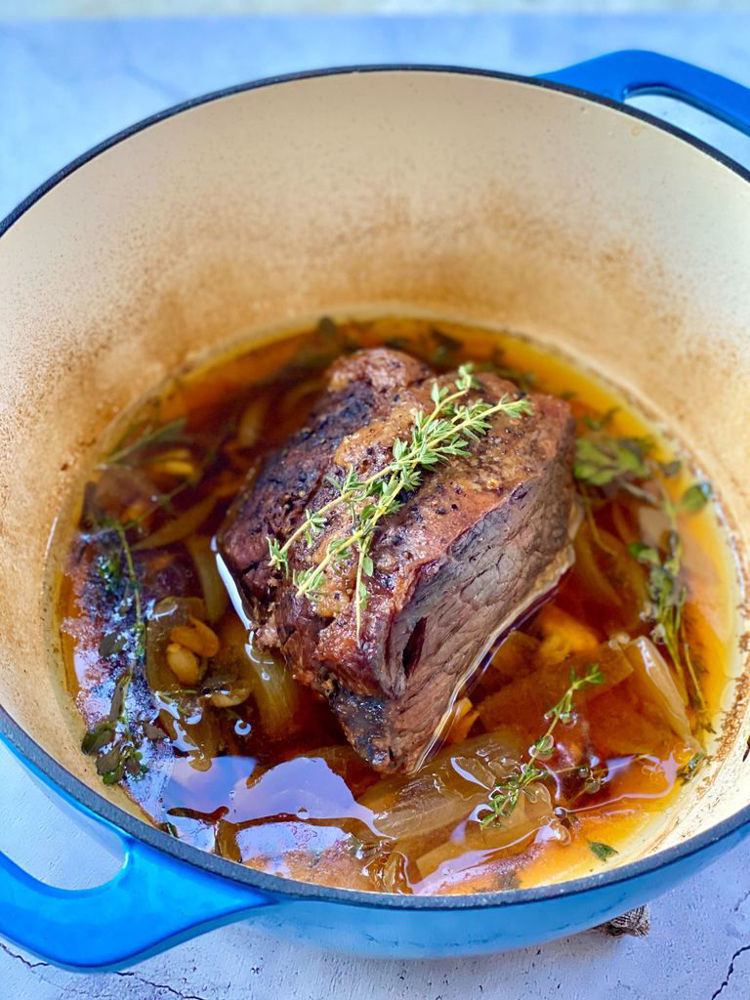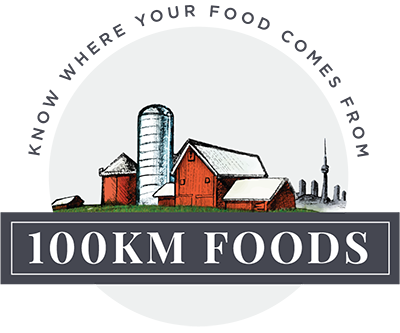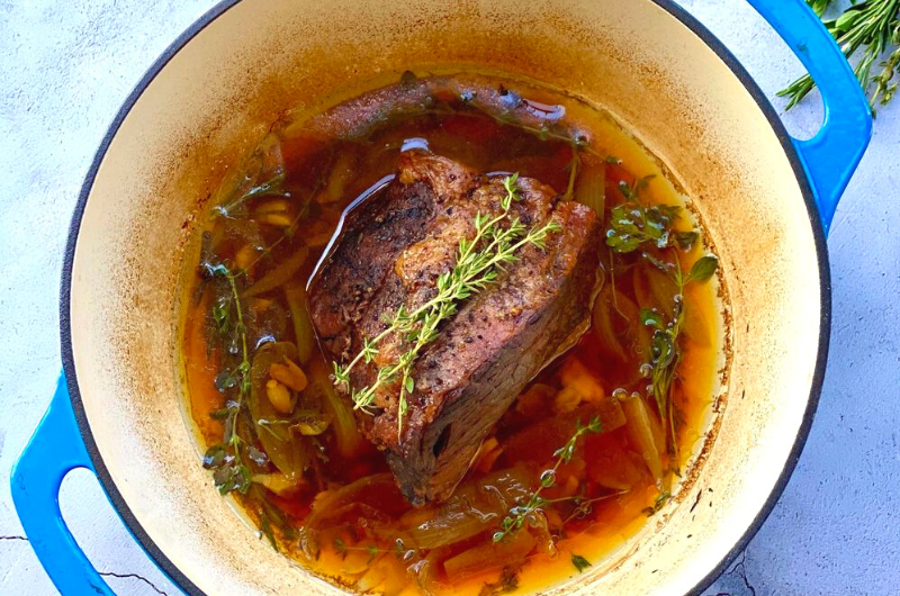
There’s something so comforting about the warm aroma of roasting beef filling your kitchen when it starts to get cold outside! The aroma instantly triggers the olfactory senses and feelings of nostalgia about the holidays and family dinners featuring a roast.
The ultimate meal to feed a crowd (or your hungry family!), this rump roast recipe is super simple, uses a few staple ingredients and requires very little hands on cooking! Onions, garlic, herbs, salt and pepper and VG Meat's tender rump roast is all you need for this rump roast!
Simply throw all the ingredients into a pot and roast, slow and low, for hours for a perfectly cooked rump roast.
And of course, you can't forget about the perfect side dish to any roast - potatoes! Serve this roast with a side of duck fat roasted potatoes (instructions also included in this recipe) for a meal that is sure to be a crowd favourite!
What is a Rump Roast?
Rump roast, as the name suggests, is a cut from the bottom round (rear leg) portion of a cow. Rump roasts are a very lean cut of meat and are perfect for roasting in the oven!
Meet Our Farmers & Producers
VG Meats
VG Meats' beef rump roast is obviously the star of this recipe!
VG Meats is family owned and operated, with four brothers – Cory, Chad, Kyle and Kevin – at the helm of the operation. Their family roots as butchers extends back generations with their grandpa Cornelius Van Groningen worked as a black market butcher in Amsterdam during WWII, hiding livestock from German troops!
VG Meats have their own bulls from whom they breed the rest of the herd. They put a big emphasis on developing their own genetic stock because the bulls from their farm are acclimated to Ontario’s environment, and they think this creates a resilient and healthy line of beef cattle.
They’ve also spent lots of time developing the best feed for the cows. Their cows are out on pasture and being fed grass most of the year. During the colder winter months, their diet is supplemented with feed mix with includes corn and other grains.
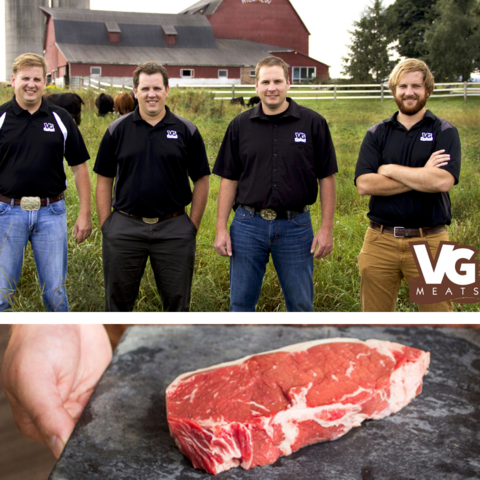
Hillside Gardens
The yellow onions that accompany the roast in this recipe are sourced from Hillside Gardens, a fourth generation family farm and processing facility in Bradford, ON.
They were early adopters of the Local Food Plus program and place a high value on sustainability and innovation. Hillside utilizes a robust traceability program and has worked with other farms on similar programs - all so that farms can improve operations, safety standards and food quality.
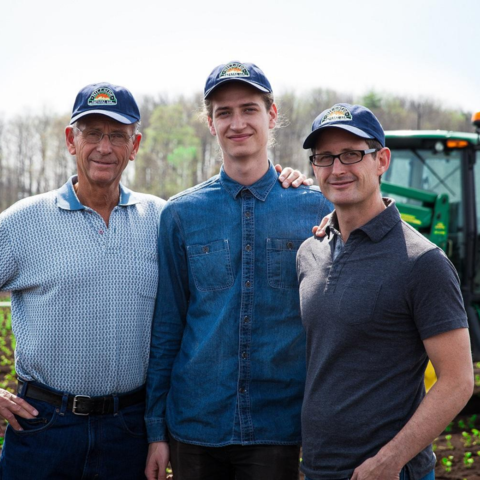
August's Harvest
Our local garlic from August's Harvest adds a beautiful flavour to this rump roast!
August’s Harvest is now one of the largest commercial garlic growers in Ontario.
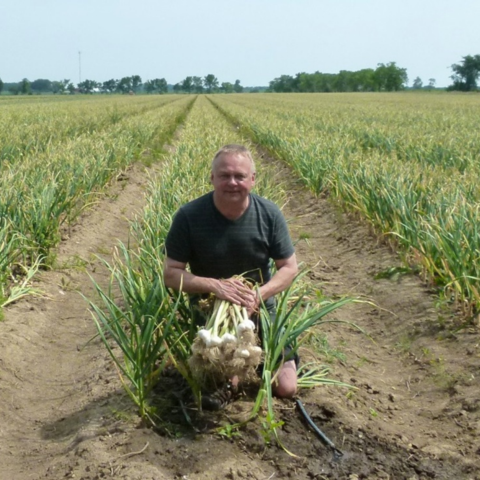
King Cole Ducks
King Cole Ducks is a family owned and operated duck farm and processing facility. They utilize every part of the ducks – they collect eggs, their products use every part of the duck, and the feathers are processed and sold to feather factories to be used in clothing and home goods.
Their rendered duck fat is used in this recipes to make the delicious duck fat potatoes!
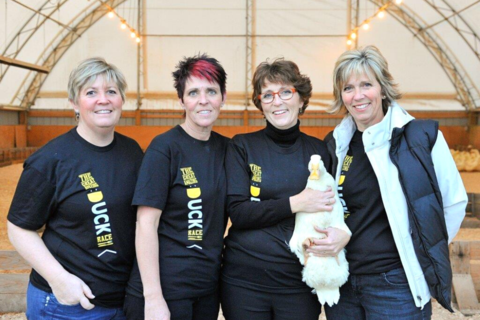
Cookstown Greens
Cookstown Greens is a family-run farm located 1 hour north of Toronto in Essa township that grows over 120 varieties of the best certified organic vegetables, greens, seedlings, garnishes and edible flowers!
Their delicious "blonde" potatoes were used to make the duck fat potatoes to accompany the roast in this recipe!
Cookstown leaves part of their land untouched and use non-intensive farming methods, which contributes to Cookstown's biodiversity. Cookstown Greens consistently practices ethical and responsible standards in their farming practices.
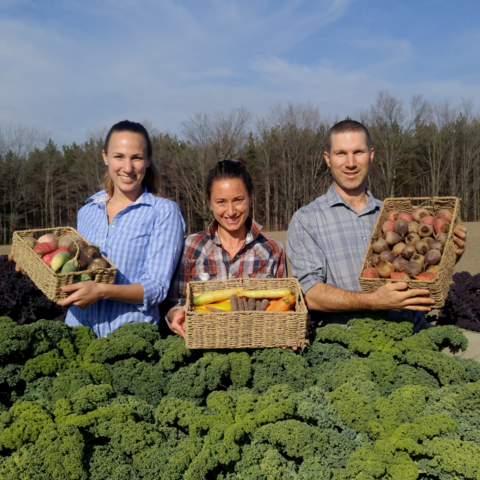
Ingredients
For the Roast
- 1 x 1.1kg VG Meats rump roast
- 1 tbsp coarse salt
- 2 tsp freshly ground pepper
- 3 x sprigs fresh thyme
- 2 x sprigs fresh rosemary
- 1 x sprig fresh oregano
- 6 x cloves August Harvest garlic peeled and crushed with blade of chef's knife
- 1 x Hillside Gardens yellow onion, peeled and sliced
- 2-4 cups water as needed
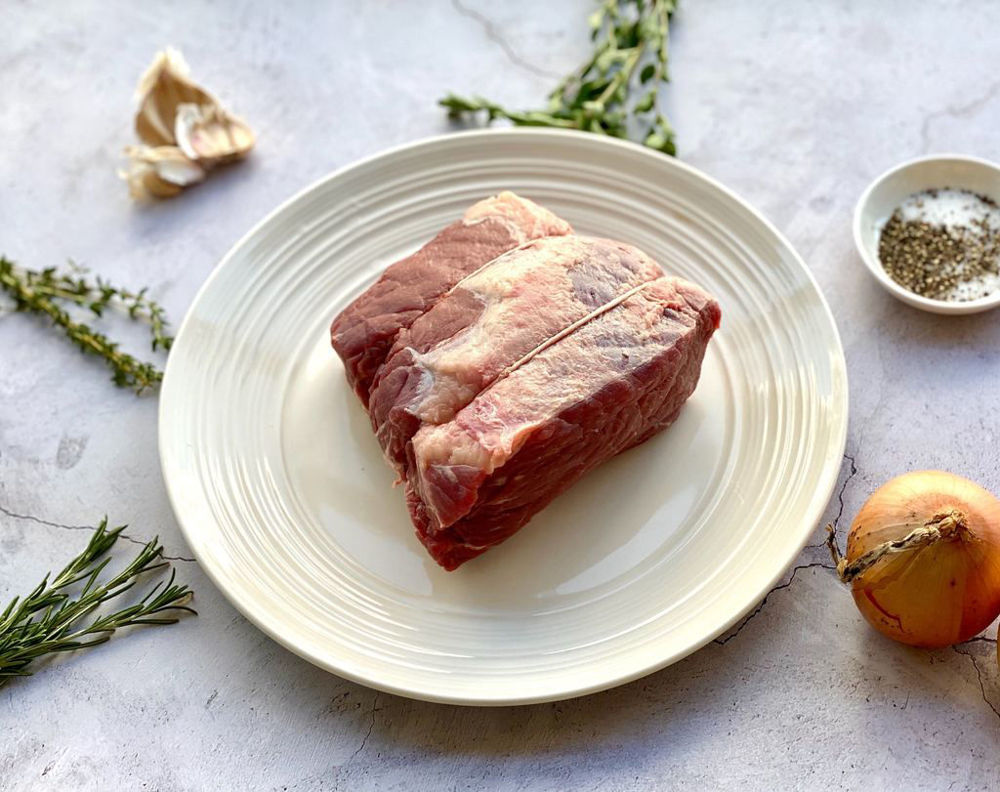
For the Duck Fat Potatoes
- 1 x pack Cookstown Greens Blonde Potatoes
- 1 tbsp King Cole rendered duck fat
- ½ tsp salt
- ½ ground black pepper
- 1 tsp chopped fresh rosemary
- 1 tsp chopped fresh thyme
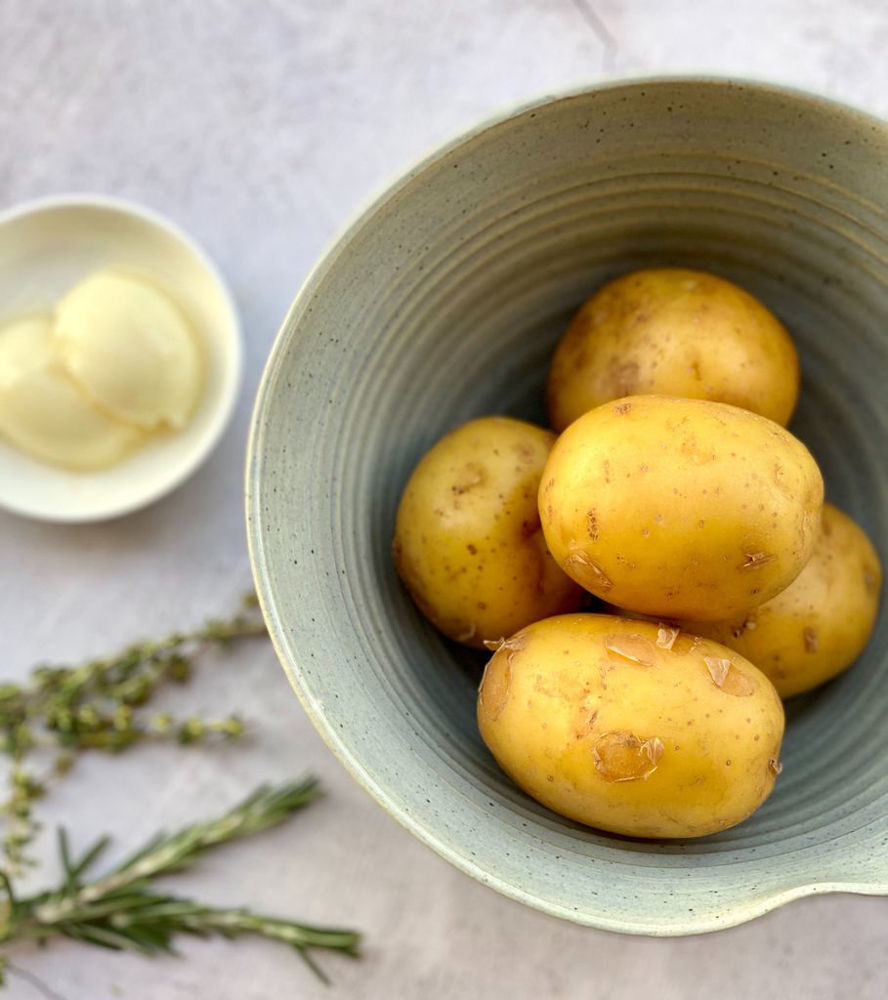
Method
Our VG Meats Rump Roasts come frozen so you will need to thaw your rump roast completely (ideally over night the day before you want to use it) before roasting.
We are roasting this rump roast low and slow so it will take about 6 hours in the oven to roast so make sure to count back 6.5 hours from when you want to eat the roast to know when you need to start preparing the roast.
Preheat the oven to 400 degrees Fahrenheit. We used a dutch oven to cook this rump roast and it turned out perfectly! If you don't have a dutch oven, you can also use a roasting pan.
Remove roast from package and drain and rinse quickly. Gently pat the roast dry with a paper towel to remove excess moisture and season generously with coarse salt and pepper, rubbing the seasonings over the entire surface of the roast.
Add whatever herbs you'd like to infuse the flavour of the roast with, in this recipe we used fresh thyme, rosemary, and oregano but you could also add bay leaf, parsley or any herb of your choice, to the dutch oven around the roast (not on top or they will burn).
Peel and cut one yellow onion into slices and add 7 cloves of garlic crushed with the blade of your chef's knife to allow it to release more flavour. Add both to your roast pan around the roast. Add about 1 cup of water to the pan (or about 3/4 inches of water in the pan).
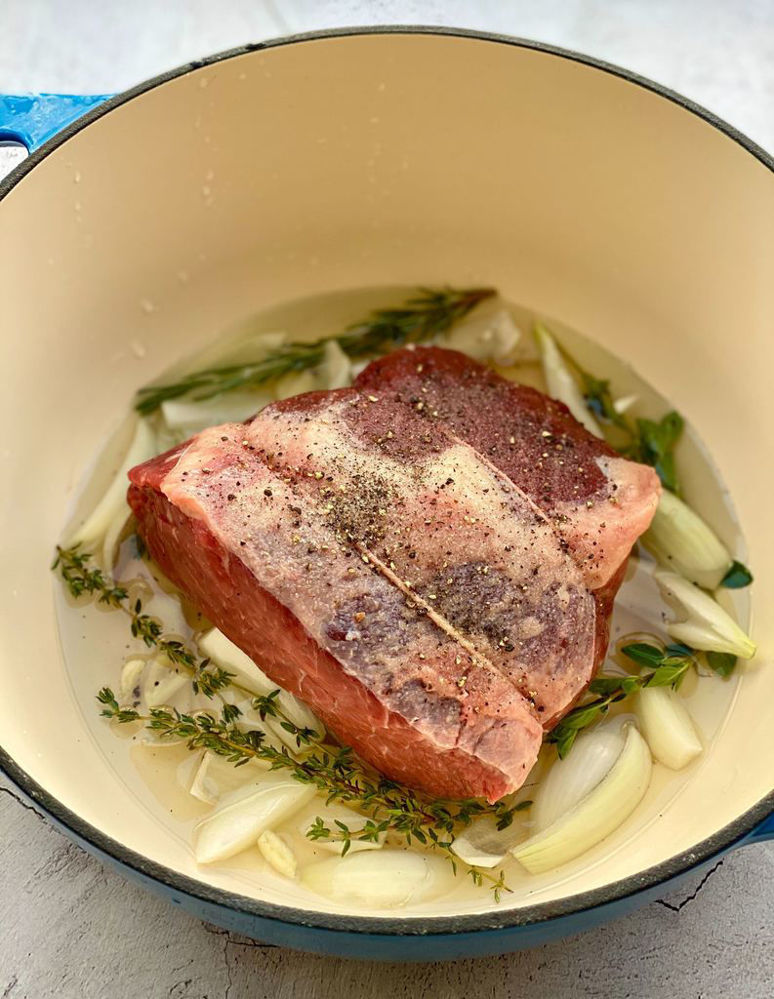
Place the roast in the preheated oven, uncovered, and allow to bake at 400 degrees for about 1 hour to brown. Check on the roast a few times during this first hour as you may need to add a bit more water to the roast as some will evaporate. You always want there to be about 1/2 inch of water in the pan.
After the roast has browned, check water level and add more water if necessary to reach that 3/4 inch level like you did when you first put the roast in the oven and cover the roast. Reduce your oven temperature to 225 degrees and allow to cook at this temperature for about 6 hours, checking the water level every so often (about once an hour) and adding more if needed.
Our VG Meats rump roasts are approximately 1.1kg so they shouldn't need more than 6 hours to roast.
Make Your Duck Fat Potatoes
While your roast is in it's final 20 minutes of roasting, start on your duck fat potatoes!
Cut your Cookstown Blonde potatoes into quarters and put in a bowl. Finely chop your herbs and add them to the bowl with salt and pepper and mix to coat the potatoes.
Heat a cast iron skillet (or a regular skillet if you don't have one) and heat on medium to high heat. Add your duck fat.
Once the pan is heated and you hear a sizzle when you add a piece of potato, carefully add the potatoes to the pan. Allow the potatoes to sit in the pan for 1-2 minutes to get caramelized and then mix.
Cook on the stove top for about 10 minutes and then add to the oven to let them finish cooking with your roast. Or, you can reduce the heat to medium and allow to continue to cook on the pan until tender (an additional 5-10 minutes).
Plate & Serve
When the roast is done, remove from the oven. Remove the roast from the pan carefully and cut off the strings. Using a serrated knife and fork, gently pull the roast apart into strips. The roast will be incredibly tender and strip very easily!
Serve with the roasted duck fat potatoes!
If you're in the mood for gravy, simply strain the liquid from the roast pan to remove the onion, garlic and herbs and add 3 tablespoons of corn starch and 1 tsp of salt. Heat on medium heat until it thickens and serve over with the roast.
Did You Try This Recipe?
If so, we'd love to see your finished product of your rump roast! Share a photo of your rump roast and tag us on Instagram @themarketat100kmfood!
